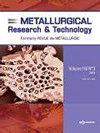氮化过程中氧化钒的相演化及元素迁移研究
IF 1.1
4区 材料科学
Q3 METALLURGY & METALLURGICAL ENGINEERING
引用次数: 0
摘要
本文通过一系列的渗氮实验,研究了渗氮过程中的相演化和元素迁移。结果表明,该材料首先经历了低温还原阶段。在室温至770℃之间,高价钒氧化物被还原为V2 O3。在Ar气氛中,v2o3在770℃~ 1080℃的温度区间内与C反应生成VC。在N2气氛中,v2o3在670℃~ 1050℃之间与N2和C直接反应生成VN。在1050°C ~ 1270°C期间,前一反应阶段得到的部分VN会与C反应生成VC。高温有利于杂质元素硫的去除。球团中碱金属元素的挥发主要发生在670℃~ 1270℃之间。然而,氮化产物中约有20%的钠和钾残留。挥发性碱金属蒸气会与炉盖上的其他气体反应,在炉盖上形成白色沉积物和沉淀物。沉积物主要由na2co3、K2 CO3、na2so4、K2 SO4、KCl等组成。本文章由计算机程序翻译,如有差异,请以英文原文为准。
Study on the phase evolution and element migration of vanadium oxide during the nitridation process
In this paper, a series of nitriding experiments were carried out to investigate the phase evolution and element migration in the nitriding process. The results show that it undergoes a low temperature reducing stage firstly. High valent vanadium oxides are reduced to V2 O3 between room temperature and 770 °C. In Ar atmosphere, V2 O3 reacts with C to form VC in the temperature interval of 770 °C∼1080 °C. In N2 atmosphere, V2 O3 reacts directly with N2 and C to form VN in the interval of 670 °C∼1050 °C. During 1050 °C∼1270 °C, part of the VN obtained in the previous reaction stage will react with C to form VC. High temperature is beneficial to the removal of impurity element sulfur. The volatilization of alkali metal elements in the pellet mainly occurs between 670 °C and 1270 °C. However, there are about 20% of sodium and potassium remain in the nitriding product. The volatile alkali metal vapor would react with other gases at the furnace cover to form a white sediment and deposits on the cover. The sediment mainly consists of Na2 CO3 , K2 CO3 , Na2 SO4 , K2 SO4 , KCl, etc.
求助全文
通过发布文献求助,成功后即可免费获取论文全文。
去求助
来源期刊

Metallurgical Research & Technology
METALLURGY & METALLURGICAL ENGINEERING-
CiteScore
1.70
自引率
9.10%
发文量
65
审稿时长
4.4 months
期刊介绍:
Metallurgical Research and Technology (MRT) is a peer-reviewed bi-monthly journal publishing original high-quality research papers in areas ranging from process metallurgy to metal product properties and applications of ferrous and non-ferrous metals and alloys, including light-metals. It covers also the materials involved in the metal processing as ores, refractories and slags.
The journal is listed in the citation index Web of Science and has an Impact Factor.
It is highly concerned by the technological innovation as a support of the metallurgical industry at a time when it has to tackle severe challenges like energy, raw materials, sustainability, environment... Strengthening and enhancing the dialogue between science and industry is at the heart of the scope of MRT. This is why it welcomes manuscripts focusing on industrial practice, as well as basic metallurgical knowledge or review articles.
 求助内容:
求助内容: 应助结果提醒方式:
应助结果提醒方式:


